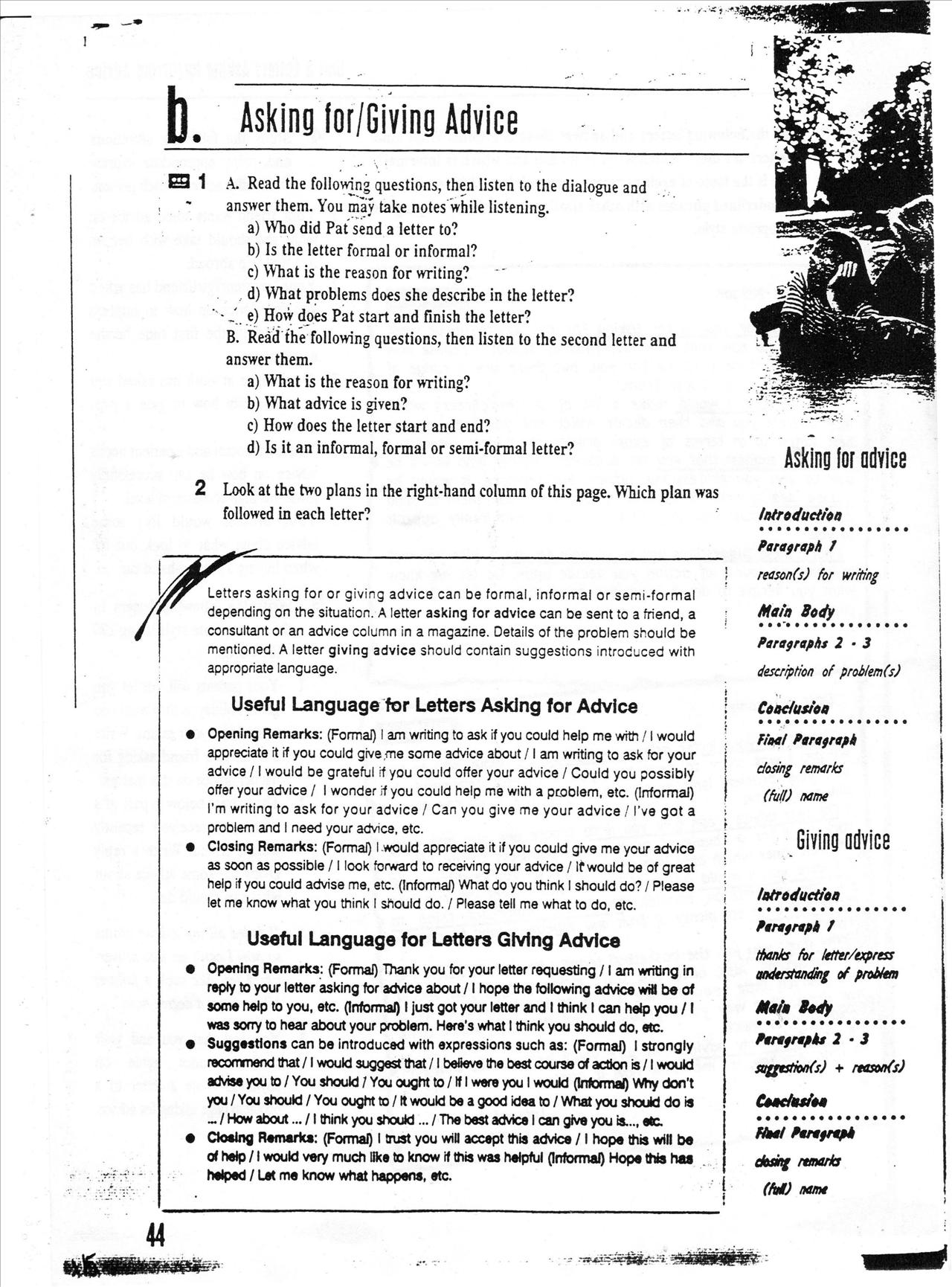Angielski asking for and givingvice

H 1
A. Read the following Ä…uestions, then listen to the dialogue and answer them. You mav take notes while listening.
a) Who did Pat send a letter to?
b) Is the letter forraal or informal?
c) What is the reason for writing?
d) What problems does she describe in the letter?
e) How does Pat start and finish the letter?
B. Read the following Ä…uestions, then listen to the second letter and answer them.
a) What is the reason for writing?
b) What advice is given?
c) How does the letter start and end?
d) Is it an informal, formal or serai-formal letter?
2 Look at the two plans in the right-hand column of this page. Which plan was followed in each letter?
Mir Letters a /( dependir
asking for or giving advice can be formal, informal or semi-formal ling on the situation. A letter asking for advice can be sent to a friend, a j consultant or an advice column in a magazine. Details of the problem should be
mentioned. A letter giving advice should contain suggestions introcuced with appropriate language.
Useful Language for Letters Asking for Advice
Opening Remarks: (Formal) I am writing to ask if you could help me with /1 would appreciate it if you could grve me some advice about /1 am writing to ask for your advice /1 would be grateful if you could offer your advice / Could you possibly offer your advice / I wonder if you could help me with a problem, etc. (Informal) Tm writing to ask for your advice / Can you give me your advice / l’ve got a problem and I need your advice, etc.
Closing Remarks: (Formal) I would appreciate it if you could give me your advice as soon as possible /1 look forward to receiving your advice / If would be of great help if you could advise me, etc. (Informal) What do you think I should do? / Please let me know what you think I should do. / Please tell me what to do, etc.
Useful Language for Letters GMng Advice
Opening Remarks: (Formal) Thank you for your letter requesting /1 am writing in repiy to your letter asking for advice about /1 hope the following adyice wid be of some help to you, etc. (Informal) I just got your letter and I think I can help you /1 was sorry to hear about your problem. Here's what I think you should do, etc. Suggestions can be introduced with expressions such as: (Formal) I strongly recommend that /1 would suggest that /1 beOeve the best course of action is /1 would advise you to / You should / You ought to / If I were you I would (Informal) Why don’t you / You should / You ought to / It would be a good idea to / What you should do is _ / How about... /1 think you should... / The best advice I can give you is..., atc. Cłoalng Remarks: (Formal) I trust you will accapt this advice /1 hope this will be of help /1 would very much Uka to know if this was hełpful (Informal) Hope this haa hełped / Lat me know what happena, etc.
â– r

ParaGraph /
reason(s) for writing
Main Body
Paragraphs 2 • 3
deseription of problem(s)
•«
Coodusfoa
F/oa/ ParaGraph
dosing remarks (M) name
lałroductioa
Paraf rapt /
tfmks for lettv/txpress onderstOK&ig of probfcm
Mata My

44
Wyszukiwarka
Podobne podstrony:
describing events 1 UNIT 4 Describins festivals/events/ceremonies 1 H! Read the following table, the
Angielski asking for and giving?vice2 Unit 8 Letters Asking for/Siving AdYice MODEL A Dear Stephan
P1010717 ■For questions 1-12, read the two texts helów and decide which answer (A, B, C or Dj best
CCF20110521�016 ou Giving advice Complete the following pieces of advice. Choose from the box. I It
15 WRITING Notes and messages TOPIĆ People EXAM TIPS ► Read the EXAM TASK carefull
31829 s&h 119 STRENGTH AND HEADTH 110 1TTE £ PIH NT -Simply following out my proposition to make phy
descr objects 1 UNIT 3 Describing Obiects 1 BB Read the table below then listen to the cassette and
Reading Conman who sold Eiffel Tower 2 3 Now read the text and see if you were right. /• 4 Read the
s&h 119 STRENGTH AND HEADTH 110 1TTE £ PIH NT -Simply following out my proposition to make physieal
31829 s&h 119 STRENGTH AND HEADTH 110 1TTE £ PIH NT -Simply following out my proposition to make phy
As 3 slight as ido to our malm arguments, we rotice that one reason for the Bill of Rights and givin
00150 D9acbde9d435381a2e9b8d77b152fd5 151 Optimization and Sensitmty Analysis account for over 90%
00471 $17d33eb6862cf36c8a862921ea9ad8 477 An Algorithm and a Graphical Approach for Short Run Proce
00483 ?a0a2174ee321f03b6f4c5f28194bec 489An Algorithm and a Graphical Approach for Short Run Proces
img166 (3) 22 22 CN: Use a light blue for D, black for F, and gray for H. (1) Do n
więcej podobnych podstron